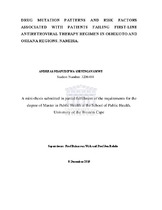| dc.contributor.advisor | Van Wyk, Brian | |
| dc.contributor.advisor | Rohde, Jon | |
| dc.contributor.author | Shiningavamwe, Andreas Ndafudifwa | |
| dc.date.accessioned | 2016-05-26T15:31:53Z | |
| dc.date.available | 2016-05-26T15:31:53Z | |
| dc.date.issued | 2015 | |
| dc.identifier.uri | http://hdl.handle.net/11394/4997 | |
| dc.description | Magister Public Health - MPH | en_US |
| dc.description.abstract | HIV/AIDS is a major health problem in Namibia with HIV prevalence estimated at 18.2% among pregnant women. Antiretroviral therapy (ART) was introduced in the public sector in 2003 and ART roll out was expanded throughout the country in the subsequent years. There are 221 ART sites in Namibia which include 34 district hospitals and 187 outreach service points. Currently there are 127,486 patients registered on ART in Namibia. However, there have been cases of patients experiencing treatment failure. The treatment failure can give rise to the emergence of HIV drug resistance. Genotyping information from patients with treatment failure can be valuable for tracking the dominant mutations conferring HIV drug resistance. However, HIV genotyping is not routinely available in Namibia due to cost. It is essential to determine the risk factors associated with development of HIV drug resistance so that these factors can be addressed. The aim of the current study was to describe HIV drug resistance mutations and the risk factors associated with HIV drug resistance among patients failing first- line ART regimen in Oshikoto and Oshana regions in Namibia. The case-control study design was used to collect data from cases who were being suspected of treatment failure to the first–line regimen in Oshikoto and Oshana regions in Namibia. The demographic, clinical and genotype information was collected from patient records. Out of 168 cases, 97 cases were eligible for this study and were matched with 105 controls. The mean age was 44.8 (±13.2) years for controls and 43.3 (±13.3) years for cases. Cases from Oshana and Oshikoto regions harboured 63% and 71% respectively for nucleoside reverse transcriptase inhibitors mutations with the dominant mutation being M184V/I. Sixty-eight percent (68%) and 76% respectively harboured mutations for non-nucleoside reverse transcriptase inhibitors with dominant mutation being K103N. Missed appointments, initiating inappropriate first-line regimen and adverse events or side effects were identified as risk factors for virological failure with odd ratios (OR) of 21.58 (95% CI 6.50 -71.59); 11.70 (95% CI 1.69 - 80.99) and 7.17 (95% CI 1.89 -27.22) respectively. Patients failing the first-line regimen need to be genotyped to assess the development of HIV drug resistance. The patients initiating ART should be educated on impacts of missing clinical appointments and adverse events of the drugs in order to prevent the emergence of drug resistance. | en_US |
| dc.language.iso | en | en_US |
| dc.publisher | University of the Western Cape | en_US |
| dc.subject | HIV | en_US |
| dc.subject | Risk factors | en_US |
| dc.subject | Drug resistance | en_US |
| dc.subject | Namibia | en_US |
| dc.subject | Genotyping | en_US |
| dc.title | Drug mutation patterns and risk factors associated with patients failing first-line antiretroviral therapy regimen in Oshikoto and Oshana regions, Namibia | en_US |
| dc.rights.holder | University of the Western Cape | en_US |

